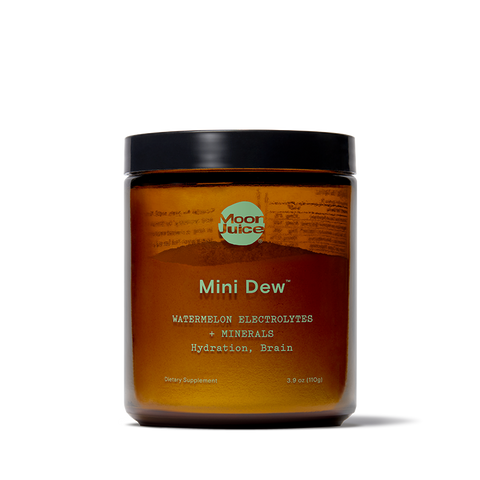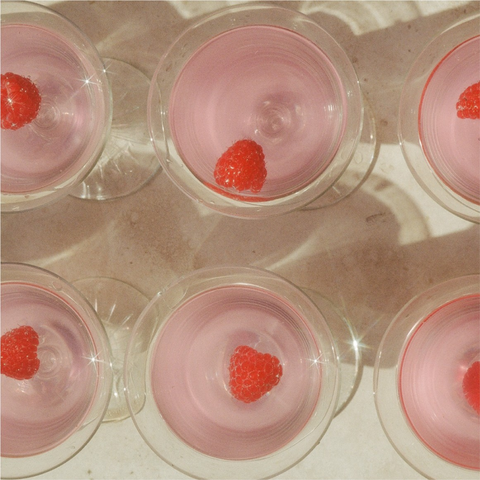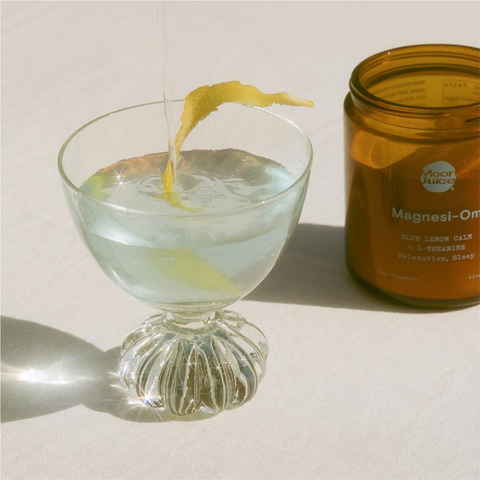Electrolytes aren’t just needed when we’ve been sweating, these vital minerals are essential to our health on a regular basis. These electrically charged minerals do a lot of work in our bodies, from keeping our hydration balanced to supporting muscle movement. Fortunately, there are lots of fruits with electrolytes that are a good source of these essential minerals and can help support bodily functions. Below, we’ll discuss some fruits high in electrolytes in-depth.
But first, which electrolytes do our bodies need? Here are some of the most significant electrolytes and their daily recommended intake:
- Potassium: The current daily recommended intake is 3,400 mg for adult males and 2,600 mg for adult females. This essential mineral is one of the most critical electrolytes our body needs, according to the Dietary Guidelines for Americans. In contrast to Sodium, which we usually consume in high amounts unless we're sweating, Potassium is an essential dietary asset for effectively reducing blood pressure.
- Calcium: For adults ages 19-50 and males aged 51-70, the recommended daily intake of Calcium is 1,000 mg. However, females over 51 and males over 71 are advised to increase their daily Calcium intake to 1,200 mg.
- Magnesium: The daily recommendation of Magnesium is 400 mg for adult males ages 19-30 and 320 mg for females ages 19-30. By the age of 31, the daily recommended amount of Magnesium is 420 mg for men and 320 mg for women.
- Phosphorus: The recommended intake is 700 mg for all adults over 18.
- Sodium: Due to our typical salt consumption in daily diets, Sodium intake is abundant, and given its link to hypertension, adhering to a maximum of 1,500 mg per day is advised. To put it in perspective, this is roughly equivalent to a quarter teaspoon of table salt. While many people exceed this amount daily, it's crucial to stick to a maximum of 2,300 mg to prevent high blood pressure.
- Chloride: Because we tend to consume almost all of our chloride from table salt, the recommended intake for chloride is the same as with Sodium.
Our bodies need these natural electrolytes all the time, but especially when we’ve lost fluids due to exercise, heat, or sickness. During times of expected dehydration, be sure to replenish with an electrolyte drink mix to help recharge your body and bring your electrolyte intake to a healthy level.
We believe that food is the first place to get your nutritional needs met. However, it’s important to note that because of modern soil depletion, the nutrient content in our produce is compromised, and it’s common for many leading to a lack of nutrients in many American diets. If you find it hard to hit your micronutrient intake on a daily basis from food, it’s highly suggested to supplement using an electrolyte powder like Mini Dew™
16 Fruits High in Electrolytes
By eating a varied diet with plenty of colorful, whole foods, you can go a long way towards meeting your nutrition needs. So, what fruits have electrolytes? Put these foods with electrolytes on your grocery list.
1. Pomelos
Pomelos are the largest citrus fruit known for their green rind and sweet, tart taste that’s similar to a grapefruit. But pomelos are also bursting with the electrolyte Potassium. One fruit (without the rind) has around 1,315 mg (roughly 43% of the daily recommended intake), with 1 cup containing around 410 mg. Pomelo also contains other natural electrolytes like Phosphorus, Magnesium, and Calcium.
2. Watermelons
As you can probably assume by its name, watermelons are great for hydration. After all, the fruit is mostly water, or about 92%. But it also boasts one of the highest electrolyte contents found in fruits, which adds to its replenishing abilities after a game or workout. Each cup of watermelon provides 170 mg of Potassium, 15.2 mg of Magnesium, 10.6 mg of Calcium, and 16.7 mg of Phosphorus.
3. Cantaloupes
Cantaloupes are another fruit that helps with proper hydration and are a good source of electrolytes! Just a cup offers 427 mg of Potassium, 14.4 mg of Calcium, 19.2 mg of Magnesium, and 24 mg of Phosphorus. This is the perfect fruit if you are looking to rebalance lost electrolytes and support overall bodily functions.
4. Bananas
Bananas are often talked about for their ample potassium content. One medium banana contains 422 mg of the mineral, making it a powerfully convenient workout snack when on the go. It also contains 26 mg of Phosphorus and 32 mg of Magnesium.
5. Coconuts
Coconut water is a favorite for its natural hydrating powers, and for good reason. Just one cup of coconut water contains about 600 mg of Potassium. That’s what makes this tropical ingredient so refreshing after a day at the beach or a night out on the town. It’s also easily swapped for water in smoothies or mocktails for extra electrolytes.
6. Pomegranates
So far, many of these fruits have been seasonal to summer, when people may be at a higher risk of losing electrolytes in the heat. But if you’re looking for a fruit that’s in season during the fall, look for pomegranates. Not only do pomegranate arils have an impressive antioxidant content, but they also offer 236 mg of Potassium per 100 grams of seeds, as well as 36 mg of Phosphorus, 12 mg of Magnesium, and 10 mg of Calcium.
7. Avocados
Avocados are usually referenced in the health space as a great source of healthy fats needed for your heart, brain, and throughout your body. But this fruit is also packed with Potassium, offering roughly 690 mg per California avocado, as well as an impressive 73.4 mg of Phosphorus and 39.4 mg of Magnesium.
8. Dried Apricots
Fresh apricots are a natural source of electrolytes, as well, but many fruits are especially concentrated in Potassium when dried, and dried apricots are a great example. 100 grams can give you 1,160 mg of Potassium. This, along with their carbohydrate content for quick fuel, makes them a great addition to your diet.
9. Oranges
There’s a good reason that orange slices are often served as a halftime snack during soccer games. Not only do they offer a high water content for a hydrating snack, but they also provide 326 mg of Potassium, 72 mg of Calcium, 18 mg of Magnesium, and 25.2 mg of Phosphorus per cup. It’s clear to see why this fruit is an excellent food to snack on if you’re looking to replenish electrolytes and support your overall health.
10. Mangoes
Bright and sunny mangoes offer an impressive electrolyte profile in addition to being a juicy tropical treat. Each cup of the fruit contains 257 mg of Potassium and a balanced showing of Calcium, Phosphorus, and Magnesium.
11. Cucumbers
Like avocados, cucumbers are technically a fruit, and they’re also a great natural source of electrolytes. One medium cucumber contains 273 mg of Potassium, 42.2 mg of Phosphorus, 28 mg of Calcium, and 24 mg of Magnesium. And since cucumbers are 96% water already, they make the perfect hydrating snack for replenishing electrolytes.
Sign Up, Nerd Out
Get wellness tips, education, and recipes
delivered straight to your inbox.
Get wellness tips, education,
and recipes delivered
straight to your inbox.
12. Tart Cherries
While tart cherries in their fruit form, aren’t as popular as other varieties, they’re an incredible source of electrolytes nonetheless. 100 grams of tart cherry juice alone or in a smoothie will give you 161 mg of Potassium. Tart cherry juice can also help increase your body’s natural melatonin levels, making it a functional, not-too-sweet alternative to red wine at night. And, like red wine, tart cherry juice offers an impressive array of antioxidants.
13. Kiwi
Kiwis are another great option when it comes to Potassium content, boasting 215 mg per fruit. Add them as an accent to your smoothie bowl, yogurt, or chia pudding for a burst of electrolytes at breakfast.
14. Lemons
Did you know that lemons have electrolytes? It’s true! This citrus fruit offers high amounts of electrolytes like Potassium (116 mg) and Calcium (21.8 mg). Hot lemon water can be a soothing digestive aid after a meal, while iced lemon water makes a refreshing infusion.
15. Strawberries
The strawberry is an excellent source of fiber and Vitamin C, but this favorite fruit also contains a high amount of electrolytes. One cup provides 233 mg of Potassium, 20 mg of Magnesium, 24 mg of Calcium, and 36.5 mg of Phosphorus.
16. Dates
Dates are another dried fruit that provides plenty of Potassium (157 mg per every Medjool date). This makes them an incredible natural alternative to sweeteners in your baked goods, smoothies, and desserts.
Takeaways
Incorporating these fruits with electrolytes into your diet ensures a flavorful whole-foods approach to balanced hydration. Some, like cucumbers and watermelon, provide a high water content, while others boast impressive antioxidant content, heart-healthy fats, and fiber for your gut. When you’re in a pinch, or if you’re limiting carbs, a sugar-free electrolyte drink mix can also help provide a boost of essential minerals whenever you need to replenish electrolytes.
Mini Dew™ supports optimal hydration by maintaining water balance in and around cells, as well as mineralization to support the body’s intricate electrical system. With a profile of essential electrolytes and trace minerals—and zero sugar—this electrolyte powder comes in 2 flavors: organic watermelon and pomelo.
Sources
- Dietary Guidelines for Americans https://www.dietaryguidelines.gov/
- National Library of Medicine, Potassium and Health https://www.ncbi.nlm.nih.gov/pmc/articles/PMC3650509/
- U.S. Department of Agriculture, FoodData Central https://fdc.nal.usda.gov/fdc-app.html#/food-details/167754/nutrients














